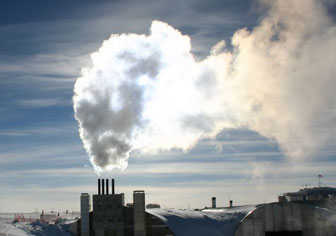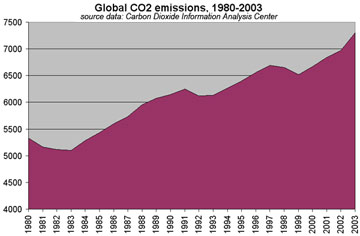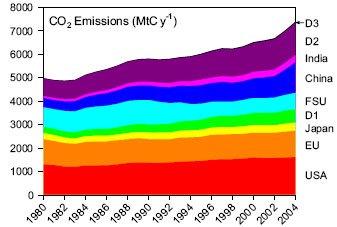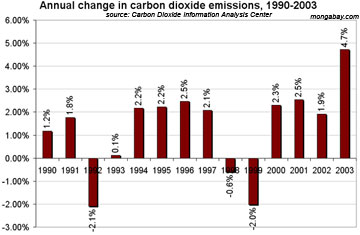CO2 emissions growth surges as global energy efficiency falls
CO2 emissions growth surges as global energy efficiency falls
No region decarbonizes its energy supply
mongabay.com
May 20, 2007
Worldwide growth in carbon dioxide emissions has doubled since the close of the 1990s, reports a study published in the early on-line edition of the Proceedings of the National Academy of Sciences. The findings suggest that the global economy is more dependent on fossil fuels than ever before, with carbon intensity—the amount of carbon needed to produce a unit of economic output—decreasing after a period of increases.
A team of researchers led by Michael R. Raupach of CSIRO-Australia found that global growth rate of CO2 increased from 1.1 % per year during the 1990s to 3.1% per year in the early 2000s. The growth is being fueled primarily by developing countries, especially China and India, where economies are fast-expanding and population continues to increase at a significantly higher rate than in industrialized nations. The study reports that the developing and least-developed economies—representing 80 percent of humanity—accounted for 73% of global emissions growth in 2004 but only 41% of global emissions and only 23% of global cumulative emissions since the mid-18th century.

Image courtesy of the Lawrence Berkeley National Laboratory. Fossil-fuel CO2 emissions for nine regions defined by the authors. Image courtesy of PNAS and the authors |
“No region is decarbonising its energy supply,” wrote the authors. “Nearly constant or slightly increasing trends in the carbon intensity of energy have been recently observed in both developed and developing regions.”
The finding that energy efficiency gains are reversing even as energy prices climb to record levels is a troubling sign says Chris Field of the Carnegie Institution’s Department of Global Ecology and a co-author of the study.
“Despite the scientific consensus that carbon emissions are affecting the world’s climate, we are not seeing evidence of progress in managing those emissions in either the developed or developing countries. In many parts of the world, we are going backwards,” said Field.
Field noted the research shows that global emissions since 2000 have grown faster than any of the scenarios developed by the Intergovernmental Panel on Climate Change (IPCC).
“The trends relating energy to economic growth are definitely headed in the wrong direction,” Field added.

Annual carbon dioxide emissions from fossil fuel combustion, 1980-2003 Annual change in carbon dioxide emissions from fossil fuel combustion, 1980-2003 |
The authors say that slowing emissions will require “progress in both the energy intensity of the economic system and the carbon intensity of the energy system.”
“Solving the first part of the puzzle requires shifting more of the economy toward activities like service industries and information technology, where emissions can be lower, and emphasizing energy efficiency,” said Field. “Solving the second requires deploying new sources of non-emitting energy like wind, solar, and nuclear power.”
CITATION: Michael R. Raupach, Gregg Marland, Philippe Ciais, Corinne Le Quere, Josep G. Canadell, Gernot Klepper,and Christopher B. Field (2007). Global and regional drivers of accelerating CO2 emissions. Proceedings of the National Academy of Sciences May 25, 2007. www.pnas.orgcgidoi10.1073pnas.0700609104

